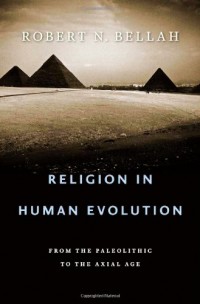 In “Religion in Human Evolution: From the Paleolithic to the Axial Age,” out this month from Harvard University Press, venerable sociologist Robert N. Bellah, who turned 84 this February, gives us the astonishing product of thirteen years of labor and a lifetime – or several, it would seem – of reading and scholarship. Bellah offers an unprecedented and near-exhaustive examination of the biological and cultural origins of religion in just 714 pages (“it could be many times longer,” he assures us).
In “Religion in Human Evolution: From the Paleolithic to the Axial Age,” out this month from Harvard University Press, venerable sociologist Robert N. Bellah, who turned 84 this February, gives us the astonishing product of thirteen years of labor and a lifetime – or several, it would seem – of reading and scholarship. Bellah offers an unprecedented and near-exhaustive examination of the biological and cultural origins of religion in just 714 pages (“it could be many times longer,” he assures us).
From the Big Bang to the playful origins of ritual to the first millennia BCE in Israel, Greece, China, and India, Bellah gleefully plunges us into a past that Thomas Mann warned was a “bottomless” well, along the way giving us an expansive view that ignores or demolishes the “arbitrary” distinctions between traditional disciplines and approaches. For Bellah, cosmology, cosmogony, mythology, ontogeny, phylogeny, and theology all belong in the same chapter, or, in some cases, the same paragraph, right alongside Hegel, Dawkins, and fistfuls of scientists, sociologists, anthropologists, and philosophers who came before, after, and inbetween.
Although the tome stops short in the first millennium BCE (leaving the last few thousand years for other scholars, or perhaps for a future volume), its overall narrative feels complete. Expect to spend a long time reading this book. And expect to see the world differently when you’ve finished—assuming you’re up for the task.
Bellah’s new work has already begun to make ripples across academia, and to a lesser extent, in the popular press.
“In this field, I do not know of an equally ambitious and comprehensive study,” wrote German philosopher Jürgen Habermas.
It seems inevitable that this book will infiltrate your syllabi. Do not be surprised to see whole stacks burdening some poor shelf in the basement of Broad Street Books this spring. Do yourself a favor and read it over winter break for a head-start.
As multidisciplinary approaches become the norm in religious studies—thanks in part to Robert Bellah, programs such as the University’s Science in Society major, and professors such as our own Mary-Jane Rubenstein—expect a more extensive range of literature that delves even deeper into our origins and our future, leaving in the dust the culture gladiators and political blatherers who gather around the science/religion “gap.”
History begins much earlier than the oldest textual evidence. For an expansive view of religion in our past, read Bellah’s book.